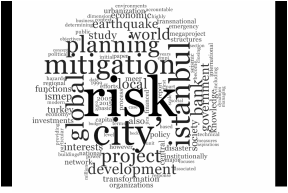Brief information on completed projects:
Comparative Analysis of National Urban Renewal Program in TurkeyDisplacement is about power dynamics in a society. Governance of development policy determines how displacement will be handled as a part of this process. If outside agencies plan displacement solely based on their terms and try to placate people, then planning for displacement deepens the existing inequalities in a society. But, in reaction to top-down planning for displacement, people may be empowered to improve the quality of their homes, livelihoods and living environments not only physically but also socially and economically. This paper explores the conditions under which this alternative planning vision for displacement is possible.
|
Invented Spaces of Activism: Gezi ParkWe take as a point of observation the 2013 Occupy movement in Istanbul’s Taksim Gezi Park to discuss practices of citizenship in the contemporary neoliberal city. Through study of this urban contestation, we find that beyond the invited spaces of participation, invented spaces of activism play a critical role in asserting citizens’ rights to the city and counter-development of exclusionary urban projects. Our special focus is with the symbolic and performative aspects of strategies that activists use to resist aggressively market-based urban development projects. We highlight these innovative forms of action as effective insurgent practices of citizenship with specific urban development outcomes.
|
Mitigating Risk in the Risk SocietyThis paper investigates the transformative power of risk discourse on local and global planning environment. In light of the theory of risk society, this study explores the transnational dynamics shaping and reshaping the local planning environments. Research presented in this paper focuses on risk mitigation and emergency preparedness planning in Istanbul. Istanbul stands out as a megacity that has been under pressure of the local and central government’s dedicated policy efforts to promote it as a global city. This study analyzes the process of how risk mitigation strategies vis-à-vis the ‘big earthquake’ that will imminently hit Istanbul have evolved from an emergency response into a globally financed megaproject in the period between 1999 and 2016. The case risk mitigation planning in Istanbul highlights the consolidated power of indisputable technical ‘knowledge’ and expertise, especially when it is combined with access to unfettered international funding. This consolidated power triggers the development of risk discourse in planning, and it undermines the democracy in local planning environment. This particular case also draws attention to a new trend of globalization of the risk mitigation planning in a broader sense. These two dynamics also reinforce epistemological challenges in risk mitigation planning.
|



